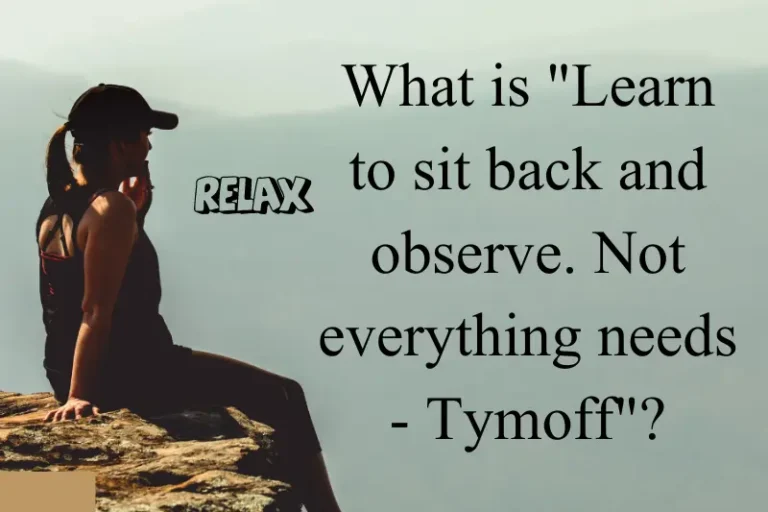It’s easy to get sucked into the cyclone of nonstop activity and reaction in today’s fast-paced world. Information, viewpoints, and happenings that demand our attention and action are all around us. But there’s a lot of skill in knowing when to just watch, and realizing that not everything requires an answer. This idea is well encapsulated in the proverb “Learn to observe from a distance.” Not everything calls for an answer, Tymoff.
The Power of Observation
Observation is a skill that is often underrated and underutilized. When we take the time to observe, we open ourselves up to a world of insights, understanding, and growth. It allows us to gain a deeper understanding of ourselves, others, and the world around us. By observing, we become more aware of patterns, nuances, and hidden meanings that may have otherwise gone unnoticed.
Tymoff, a platform that encourages personal and professional development, emphasizes the importance of observation in its mantra. They understand that by learning to sit back and observe, we can make better decisions, build stronger relationships, and navigate through life’s challenges with grace and wisdom.
The Art of Non-Reaction
In a world where instant reactions and quick responses are often praised, the art of non-reaction is a refreshing and powerful concept. It is about resisting the urge to jump into every situation with an immediate response. Instead, it is about taking a step back, assessing the situation, and choosing a thoughtful and intentional course of action.
Tymoff recognizes that not everything needs a reaction. Sometimes, reacting impulsively can lead to unnecessary conflict, misunderstandings, and regret. By learning to sit back and observe, we allow ourselves to respond rather than react. We can pause, reflect, and choose a response that aligns with our values and goals.
Moreover, non-reaction does not mean being passive or indifferent. It is about choosing when and how to respond, rather than being driven by every external stimulus. It is about taking control of our emotions and actions, rather than being at the mercy of every situation.
The Benefits of Non-Reaction
There are numerous benefits to embracing the philosophy of “learning to sit back and observe. Not everything needs a reaction – Tymoff.” Here are a few:
1. Enhanced Self-Awareness:
When we observe without immediate reaction, we create space for self-reflection. We become more aware of our thoughts, emotions, and triggers. This self-awareness allows us to make conscious choices and respond in ways that are aligned with our true selves.
2. Improved Relationships:
Reacting impulsively can strain relationships. By learning to sit back and observe, we can better understand others’ perspectives, empathize with their feelings, and respond in a way that promotes understanding and connection. This leads to healthier and more fulfilling relationships.
3. Better Decision-Making:
Observation provides us with valuable information and insights. By taking the time to gather information and consider different perspectives, we can make more informed decisions. This leads to better outcomes and reduces the chances of making hasty or regrettable choices.
4. Reduced Stress:
Reacting to every situation can be exhausting and overwhelming. By practicing non-reaction, we can reduce stress and anxiety. We give ourselves the freedom to choose our battles and conserve our energy for what truly matters.
Conclusion
The mantra “learn to sit back and observe. Not everything needs a reaction – Tymoff” reminds us of the power of observation and the wisdom of non-reaction. By embracing this philosophy, we can navigate through life with greater awareness, intention, and peace. So, let’s take a moment to pause, observe, and choose our responses wisely.

